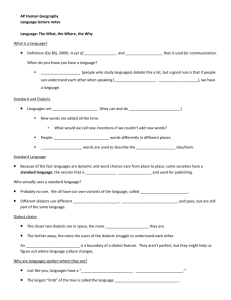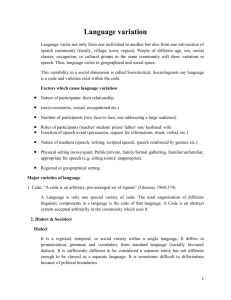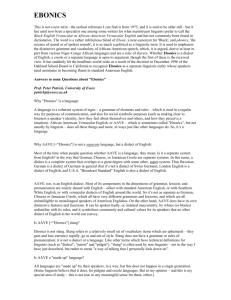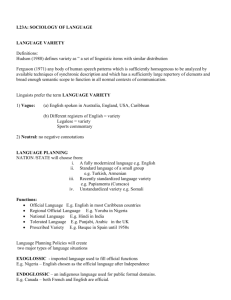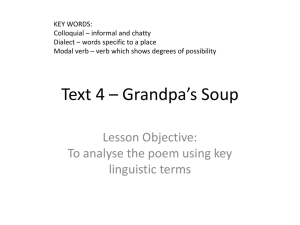Black English - Geoff Barton
advertisement
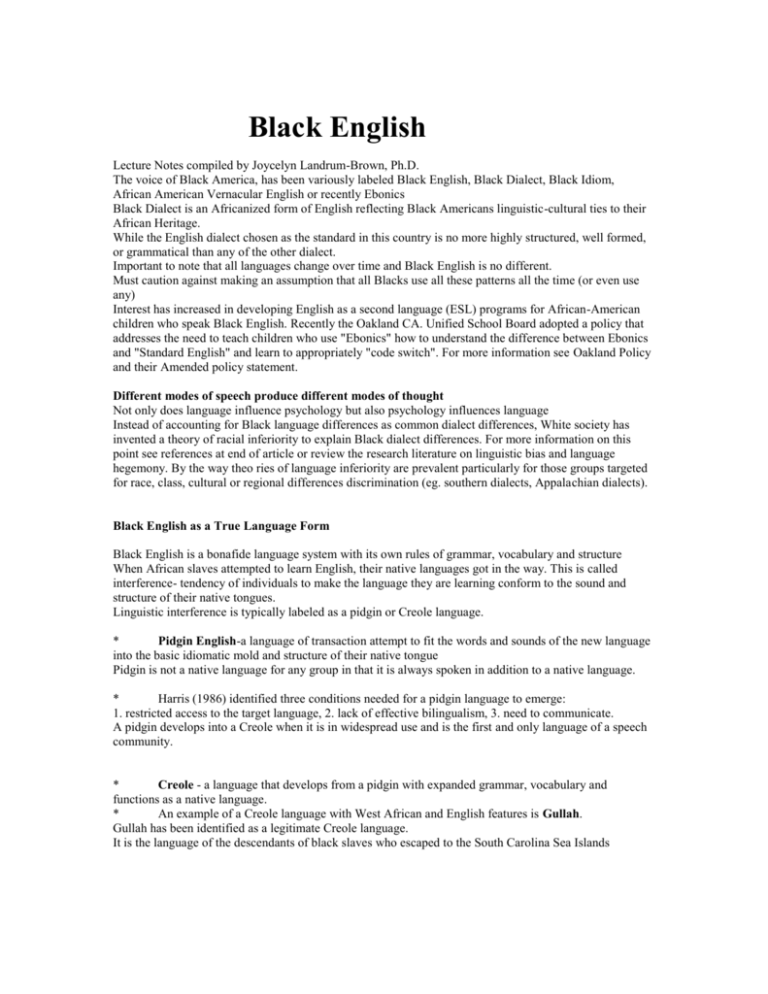
Black English Lecture Notes compiled by Joycelyn Landrum-Brown, Ph.D. The voice of Black America, has been variously labeled Black English, Black Dialect, Black Idiom, African American Vernacular English or recently Ebonics Black Dialect is an Africanized form of English reflecting Black Americans linguistic-cultural ties to their African Heritage. While the English dialect chosen as the standard in this country is no more highly structured, well formed, or grammatical than any of the other dialect. Important to note that all languages change over time and Black English is no different. Must caution against making an assumption that all Blacks use all these patterns all the time (or even use any) Interest has increased in developing English as a second language (ESL) programs for African-American children who speak Black English. Recently the Oakland CA. Unified School Board adopted a policy that addresses the need to teach children who use "Ebonics" how to understand the difference between Ebonics and "Standard English" and learn to appropriately "code switch". For more information see Oakland Policy and their Amended policy statement. Different modes of speech produce different modes of thought Not only does language influence psychology but also psychology influences language Instead of accounting for Black language differences as common dialect differences, White society has invented a theory of racial inferiority to explain Black dialect differences. For more information on this point see references at end of article or review the research literature on linguistic bias and language hegemony. By the way theo ries of language inferiority are prevalent particularly for those groups targeted for race, class, cultural or regional differences discrimination (eg. southern dialects, Appalachian dialects). Black English as a True Language Form Black English is a bonafide language system with its own rules of grammar, vocabulary and structure When African slaves attempted to learn English, their native languages got in the way. This is called interference- tendency of individuals to make the language they are learning conform to the sound and structure of their native tongues. Linguistic interference is typically labeled as a pidgin or Creole language. * Pidgin English-a language of transaction attempt to fit the words and sounds of the new language into the basic idiomatic mold and structure of their native tongue Pidgin is not a native language for any group in that it is always spoken in addition to a native language. * Harris (1986) identified three conditions needed for a pidgin language to emerge: 1. restricted access to the target language, 2. lack of effective bilingualism, 3. need to communicate. A pidgin develops into a Creole when it is in widespread use and is the first and only language of a speech community. * Creole - a language that develops from a pidgin with expanded grammar, vocabulary and functions as a native language. * An example of a Creole language with West African and English features is Gullah. Gullah has been identified as a legitimate Creole language. It is the language of the descendants of black slaves who escaped to the South Carolina Sea Islands Turners research on Gullah in 1949 found not only fundamental African survivals in sound and syntax, but nearly 6,000 West African words used in personal names and nicknames in songs and stories as well as in everyday conversation One key difference between Gullah and Black English is that Gullah is a Creole language and Black English is considered to be a dialect. Development of Black Dialect There are two schools of thought regarding the origins of Black Dialect, the Anglian-based tradition and the African-based tradition. The Anglian tradition of scholars (Krapp,1925; Kurath,1949) believe that Black English is traceable to British dialects of Old and Middle English, which the slave picked up from white immigrants whom settled in the South during the colonial era. As a result they asserted that Black speech is just archaic white speech that has been sustained by linguistic isolation. This view argues that all traces of African heritage and culture where stripped from the slaves. The African-based tradition asserts that Black English is really Africanized English, which can be traced to the formation of English pidgins and Creoles during the slave trade. From this perspective Black English developed as a result of a language combining various European languages (depending on the region of the country and the immigrants settled there). I tend to see the development of Black Dialect as a combination of both the Anglian and African-based traditions. Two Dimensions of Black Speech When considering Black English it is helpful to distinguish between the two dimensions: Language and Style. * * Language Sounds * Grammar and structure * The words * Style Style involves the way speakers put sounds and grammatical structure together to communicate meaning in a larger context * It is what you do with the words * It incorporates the total expression, for example using black rhythmic speech * It may be "songified" * May use speech rhymes, voice inflections and tonal patterns Linguistics of Black English Linguists define Black English as a hybrid language containing elements of Euro-American English ("standard English") and elements of West African Languages (surviving Africanisms from Yoruba, Ibo, Ewe, etc.) The vocabulary of the new language is fairly easy to master, but the syntactical structure and idiomatic rules require considerable time and practice to master While all languages change over time the structure of a language remains relatively rigid and fixed. It is important to note that the greatest differences between black and white English are on the level of grammatical structure -----------------------------------------------------------------------Some examples of Black English follow: 1. Indicating habitual action through verb structure, notably using the form "be" as a verb. This use of be derives from an aspectual verb system that is also found in many African languages. Its use conveys the speaker's meaning with reference to the qualitative character and distribution of an action over time. "He be hollering at us", "I like the way he be psyching people out" 2. Indicating remote past through verb structure, notably using "been" with stress. "She been gone" 3. Predication with optional copula The sense of complete predication conveyed by a noun followed by an adjective, adverb, verb, noun, or prepositional phrase. This is common in many West African languages, (e.g., in Kimbundu, Ene macamba, literally "They friends") "He real little", "They in the house", "My momma name Joyce" 4. Semantic Inversion, turning a word into its opposite. This feature is familiar in Mandingo, a ka nyi ko-jugu, literally, "It is good badly", or it is so good that it's bad. 5. Appropriating and secularizing church terms. Some terms are derived from the Traditional Black Church. "On T", "Testify" 6. Pronominal apposition, repeating the subject for emphasis. This feature is common in Yoruba, Eya me, ot cu, literally, "My mother, she has died" 7. Use of speech acts, that are either not in White English at all or are not used according to the same set of social rules of speaking. Signifyin'- the verbal art of insult Dozens- a form of signification where one signifies on anothers kinfolk. Use of Proverbs- "What goes around, comes around", "A hard head makes a soft behind" 8. Signaling of possession by context and/or juxtaposition. No use of inflectional -z (written as apostrophe s) "My daddy name John" 9. Tonal Semantics The use of voice and rhythm and vocal inflection to convey meaning. This gives Black speech its songified or musical quality. Both Black rappers and preachers use word sound to communicate at deeper levels to which words alone cannot convey. Examples include shouting, intonational contouring, use of rhyme, repetition and alliterative word-play. From a strictly linguistic view, Smitherman(1995) indicates that West African languages are tone languages. The speakers of these languages rely on the tone with which they pronounce syllables, sounds, and words to convey their meaning. The space does not allow for a full exploration of examples of Black English. For a more thorough coverage of this topic the reader is referred to Smitherman (1977); Dandy (1991); Major (1970); Labov (1972); Dillard (1972); Rickford (1975); Kochman (1972,1981); Baugh (1983); and Spears (1984). Specific Examples of Grammar and Structure Rule in West African Languages repetition of noun subject with pronoun - My father, he work hard question patterns without do - what it come to same form of noun for singular and plural - one boy ; five boy No tense indicated in verb: emphasis on manner or character of action - I know it good when he ask me Same verb for for all subjects - I know ; you know; he know; we know; they know ------------------------------------------------------------------------
